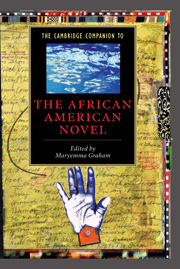Book contents
- Frontmatter
- Introduction
- Part I The long journey
- Part II Search for a form
- Part III African American voices
- 10 Everybody’s protest novel
- 11 Finding common ground
- 12 American Neo-HooDooism
- 13 Spaces for readers
- 14 African American womanism
- 15 Vernacular modernism in the novels of John Edgar Wideman and Leon Forrest
- Bibliography
- Index
- Series List
12 - American Neo-HooDooism
from Part III - African American voices
Published online by Cambridge University Press: 28 May 2006
- Frontmatter
- Introduction
- Part I The long journey
- Part II Search for a form
- Part III African American voices
- 10 Everybody’s protest novel
- 11 Finding common ground
- 12 American Neo-HooDooism
- 13 Spaces for readers
- 14 African American womanism
- 15 Vernacular modernism in the novels of John Edgar Wideman and Leon Forrest
- Bibliography
- Index
- Series List
Summary
Because reading Reed's fiction is like savoring and devouring Gombo Févi or Gumbo à la Creole, two metaphors that Reed develops in the poem “The Neo-HooDoo Aesthetic” and the novel The Last Days of Louisiana Red (1974), a thorough analysis of Reed's novels must start by recognizing their underlying postcolonial discourse, African Diaspora reconnection, and multicultural poetics. Because so far very little attention has been directed toward the intertextuality that pervades his work (novels, poems, plays, essays), Reed has been rightly complaining about both readers and critics' failure to investigate the allusions used in his work. By failing to both investigate the multiplicity of allusions in Reed's novels and to regard Neo-HooDooism as a poetics of multiculturalism, critics have either misread or misinterpreted Reed's novels. In his Writin' Is Fightin': Thirty-Seven Years of Boxing on Paper (1990), Reed complains that when he “set out to add fresh interpretations to an ancient Afro-American oral literature by modernizing its styles so as to reach contemporary readers,” he knew that his work would be greeted with controversy. He further states that he knew that some critics “would dismiss the material [included in his work] as arcane, when millions of people in North, South, and Central America, the Caribbean, and Africa are acquainted with the structures [he] used” (137).
- Type
- Chapter
- Information
- The Cambridge Companion to the African American Novel , pp. 203 - 220Publisher: Cambridge University PressPrint publication year: 2004
- 1
- Cited by



